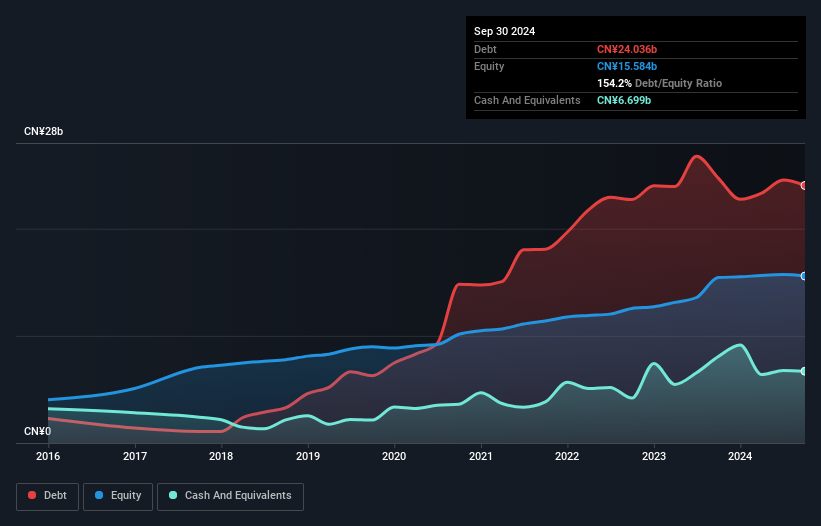- China
- /
- Healthcare Services
- /
- SZSE:000950
Is C.Q. Pharmaceutical Holding (SZSE:000950) A Risky Investment?

David Iben put it well when he said, 'Volatility is not a risk we care about. What we care about is avoiding the permanent loss of capital.' When we think about how risky a company is, we always like to look at its use of debt, since debt overload can lead to ruin. As with many other companies C.Q. Pharmaceutical Holding Co., Ltd. (SZSE:000950) makes use of debt. But the more important question is: how much risk is that debt creating?
Why Does Debt Bring Risk?
Debt is a tool to help businesses grow, but if a business is incapable of paying off its lenders, then it exists at their mercy. Ultimately, if the company can't fulfill its legal obligations to repay debt, shareholders could walk away with nothing. However, a more frequent (but still costly) occurrence is where a company must issue shares at bargain-basement prices, permanently diluting shareholders, just to shore up its balance sheet. By replacing dilution, though, debt can be an extremely good tool for businesses that need capital to invest in growth at high rates of return. When we examine debt levels, we first consider both cash and debt levels, together.
See our latest analysis for C.Q. Pharmaceutical Holding
What Is C.Q. Pharmaceutical Holding's Debt?
As you can see below, C.Q. Pharmaceutical Holding had CN¥24.0b of debt, at September 2024, which is about the same as the year before. You can click the chart for greater detail. However, because it has a cash reserve of CN¥6.70b, its net debt is less, at about CN¥17.3b.

How Healthy Is C.Q. Pharmaceutical Holding's Balance Sheet?
We can see from the most recent balance sheet that C.Q. Pharmaceutical Holding had liabilities of CN¥44.7b falling due within a year, and liabilities of CN¥6.35b due beyond that. Offsetting these obligations, it had cash of CN¥6.70b as well as receivables valued at CN¥38.0b due within 12 months. So its liabilities total CN¥6.29b more than the combination of its cash and short-term receivables.
This deficit is considerable relative to its market capitalization of CN¥10.2b, so it does suggest shareholders should keep an eye on C.Q. Pharmaceutical Holding's use of debt. This suggests shareholders would be heavily diluted if the company needed to shore up its balance sheet in a hurry.
We use two main ratios to inform us about debt levels relative to earnings. The first is net debt divided by earnings before interest, tax, depreciation, and amortization (EBITDA), while the second is how many times its earnings before interest and tax (EBIT) covers its interest expense (or its interest cover, for short). Thus we consider debt relative to earnings both with and without depreciation and amortization expenses.
C.Q. Pharmaceutical Holding shareholders face the double whammy of a high net debt to EBITDA ratio (9.8), and fairly weak interest coverage, since EBIT is just 2.1 times the interest expense. The debt burden here is substantial. Even worse, C.Q. Pharmaceutical Holding saw its EBIT tank 23% over the last 12 months. If earnings continue to follow that trajectory, paying off that debt load will be harder than convincing us to run a marathon in the rain. The balance sheet is clearly the area to focus on when you are analysing debt. But ultimately the future profitability of the business will decide if C.Q. Pharmaceutical Holding can strengthen its balance sheet over time. So if you want to see what the professionals think, you might find this free report on analyst profit forecasts to be interesting.
Finally, while the tax-man may adore accounting profits, lenders only accept cold hard cash. So we always check how much of that EBIT is translated into free cash flow. Considering the last three years, C.Q. Pharmaceutical Holding actually recorded a cash outflow, overall. Debt is far more risky for companies with unreliable free cash flow, so shareholders should be hoping that the past expenditure will produce free cash flow in the future.
Our View
To be frank both C.Q. Pharmaceutical Holding's net debt to EBITDA and its track record of (not) growing its EBIT make us rather uncomfortable with its debt levels. And furthermore, its conversion of EBIT to free cash flow also fails to instill confidence. We should also note that Healthcare industry companies like C.Q. Pharmaceutical Holding commonly do use debt without problems. Overall, it seems to us that C.Q. Pharmaceutical Holding's balance sheet is really quite a risk to the business. So we're almost as wary of this stock as a hungry kitten is about falling into its owner's fish pond: once bitten, twice shy, as they say. When analysing debt levels, the balance sheet is the obvious place to start. But ultimately, every company can contain risks that exist outside of the balance sheet. Case in point: We've spotted 3 warning signs for C.Q. Pharmaceutical Holding you should be aware of, and 1 of them shouldn't be ignored.
Of course, if you're the type of investor who prefers buying stocks without the burden of debt, then don't hesitate to discover our exclusive list of net cash growth stocks, today.
New: AI Stock Screener & Alerts
Our new AI Stock Screener scans the market every day to uncover opportunities.
• Dividend Powerhouses (3%+ Yield)
• Undervalued Small Caps with Insider Buying
• High growth Tech and AI Companies
Or build your own from over 50 metrics.
Have feedback on this article? Concerned about the content? Get in touch with us directly. Alternatively, email editorial-team (at) simplywallst.com.
This article by Simply Wall St is general in nature. We provide commentary based on historical data and analyst forecasts only using an unbiased methodology and our articles are not intended to be financial advice. It does not constitute a recommendation to buy or sell any stock, and does not take account of your objectives, or your financial situation. We aim to bring you long-term focused analysis driven by fundamental data. Note that our analysis may not factor in the latest price-sensitive company announcements or qualitative material. Simply Wall St has no position in any stocks mentioned.
About SZSE:000950
Moderate growth potential low.

